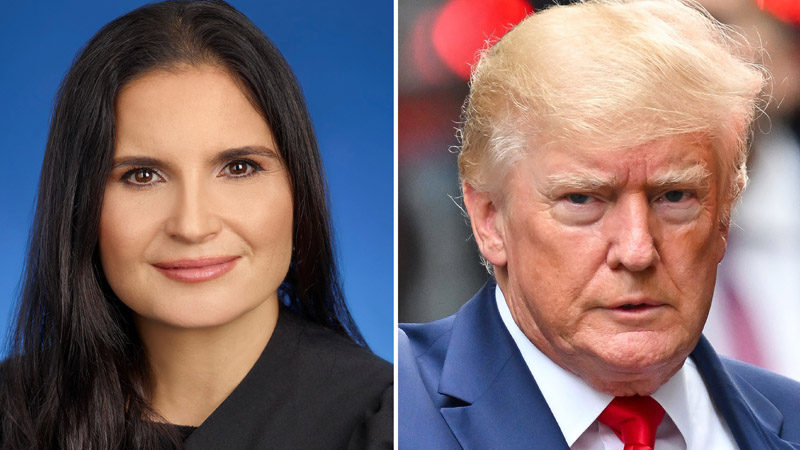Donald Trump’s recent move to vocally support Judge Aileen Cannon via his Truth Social platform on Thursday has sparked a significant response from MSNBC political analyst Steve Benen. Trump, who has been notably critical of the judiciary in cases against him, surprisingly defended Judge Cannon amidst widespread scrutiny.
This action has led to an intriguing conversation about the consistency of his attitude towards the judiciary. Benen, known for his incisive political commentary, highlighted a stark contrast in Trump’s behavior. While Trump has frequently led vociferous attacks against other judges involved in his numerous legal entanglements, his defense of Judge Cannon stands out as a departure from his usual rhetoric.
On Thursday Trump wrote, “They are calling her terrible names, wrongfully threatening her with Impeachment, and disrespecting her, all because they want her to act like the dishonest, politically biased, and conflicted Judges in New York,” while making the case he feels Cannon is being “harassed.”
Benen’s analysis suggests that Trump’s support for Cannon is not just a simple act of backing a judge but is layered with complexities and contradictions. The core of Benen’s argument revolves around what he describes as “truly breathtaking levels of hypocrisy.” According to Benen, Trump’s actions reflect a broader issue of credibility and consistency. He pointed out that the defense of Judge Cannon by Trump is particularly jarring given his history of berating other judges overseeing his trials.
This behavior raises questions about Trump’s motives and the principles guiding his interactions with the judiciary. Moreover, Benen dismissed Trump’s recent claims in defense of Judge Cannon as delusional. He noted that, contrary to Trump’s assertions, there has been no record of any prosecutor or involved party engaging in name-calling or threats of impeachment against Judge Cannon. This statement from Trump, Benen argues, not only lacks basis in fact but also underscores a pattern of misinformation that seems designed to sway public opinion unjustly.
“If anyone has any doubts about this, they should feel free to ask U.S. District Judge Gonzalo Curiel, U.S. District Judge Lewis Kaplan, New York State Supreme Court Justice Juan Merchan, New York State Supreme Court Justice Arthur Engoron, and U.S. District Judge Tanya Chutkan, each of whom has been on the receiving end of Trump delegitimizing tantrums,” he wrote before suggesting, “If the former president believes such conduct constitutes ‘illegal harassment,’ he might as well turn himself into the authorities now.”
In analyzing Trump’s strategy, Benen suggests that Trump’s selective support might be an attempt to influence public and judicial sentiment in his favor. By defending Judge Cannon, who has faced criticism in legal circles, Trump could be trying to curry favor or create a more favorable narrative around the cases involving him.
The discussion around Trump’s latest actions brings to light the complex dynamics between the former president and the judicial system. It underscores the tensions that arise when political figures engage directly with judicial processes and personnel. Benen’s critique extends beyond the immediate issue to touch upon broader concerns about the integrity of judicial proceedings and the potential impact of political pressures on legal outcomes.
“Trump has a variety of reasons to launch campaigns against the judges overseeing his cases, but the more the former president talks about others working the refs, the more he makes clear that he goes after judges and their families as part of a larger effort to work the refs,” he accused.
This scenario also highlights the challenges faced by the media and the public in deciphering the motivations behind Trump’s public declarations. As Trump continues to be a polarizing figure, his interactions with the legal system remain a critical area of scrutiny, revealing much about the interplay between politics, law, and public perception in contemporary America.

